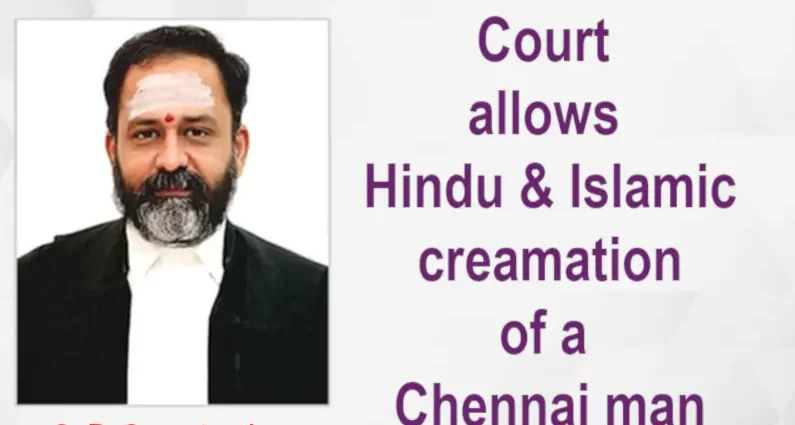On 19 February, a judge of the Madras High Court Justice GR Swaminathan delivered a unique judgment which portrays the beauty of the Indian constitution and how pluralistic, multicultural and multi-religious communities of India live together happily and in peace.
The case pertained to the death of a Balasubramanian (Bala) who was a Hindu by birth but later converted to Islam.
Bala, a Hindu married B. Shanthi also Hindu on in 1988 as per Hindu rites and customs. They had a daughter named Bhavani.
Working as driver in Tamil Nadu State Transport Corporation, Bala fell in love with a Muslim woman named Syed Ali Fatima (Fatima). Bala later converted to Islam and became Anwar Hussain to marry Fatima. In 1999 they married as per Islamic rites and customs. They then had a son named Abdul Malik (Abdul).
Bala @ Anwar Hussain passed away on 17.02.2024. He had not made a Will and thus did not express his wishes as to how he would like the last rites to be performed on his dead body.
B. Shanthi, his wife and daughter Bhavani wanted to perform the last rituals for Bala as per the Hindu religion, being his only legally wedded wife and legitimate daughter.
At the same time Fatima and son Abdul wanted to perform Bala@Anwar Hussain’s last rites as per their Islamic customs traditions.
It created problems for the authorities because they had to decided who to hand over his dead body.
Under the Indian law, because Bala@Anwar was already married to B. Shanthi, his Islamic marriage to Fatima is in fact punishable under the Indian law.
B. Shanthi approached the Madras High Court to assert her rights as legally wedded wife while son Abdul Malik sought orders for his mother Fatima.
In the absence of a Will or any expression of Bala@Anwar Hussain’s wishes, the judge, Justice GR Swaminathan permitted B. Shanthi and daughter Bhavani to perform the final rituals as per Hindus customs and Fatima and son Abdul to dispose of his body as per Muslim rites since he had converted to Islam and died as Anwar Hussain.
Also read: 1984 Sikh Riots :Justice at last – Sajjan Kumar to die in jail
In the order passed on February 19, Justice GR Swaminathan said the freedom guaranteed under Article 25 (right to religion) of the Constitution of India is such that it does not encroach upon a similar freedom of others.
“Under the Constitutional Scheme, every person has a fundamental right not merely to entertain the religious belief of his choice but also to exhibit this belief an ideas in a manner which does not infringe the religious right and personal freedom of others,” Justice GR Swaminathan said in the order.
The Court further said that the right to participate in the funeral ceremony of the parent or a spouse will fall within the sweep of the right under Article 25. It, therefore, held that the Hindu wife and daughter of the deceased man, being the legally wedded wife and legitimate daughter are entitled to offer their respects in the customary religious manner.
“The authorities concerned are directed to hand over the body of the deceased to the Hindu wife and daughter so that they can perform certain customary religious ceremonies,” Justice GR Swaminathan said.
The Court said two issues were involved in the matter – one was the rights of the ones who are alive and the other the right of the one who is dead.
Hence, it allowed the B. Shanthi to perform customary rituals as per Hinduism.
Finding that the same cannot extend to the disposal of the body since the deceased was a Muslim, the Court allowed Fatima and Abdul to follow the Islamic rituals to complete Bala@Anwar Hussains’ last rites.
Similar Posts by The Author:
- The Untold story of the ANZAC-India friendship
- VHP Australia brings Hindus together to work toward ‘growing and thriving Australia’
- Australia Post – new performance standards from 15 April
- Premier’s department fighting the release of SECRET hotel quarantine documents
- Vic Gov funds 13 programs that help international Students

